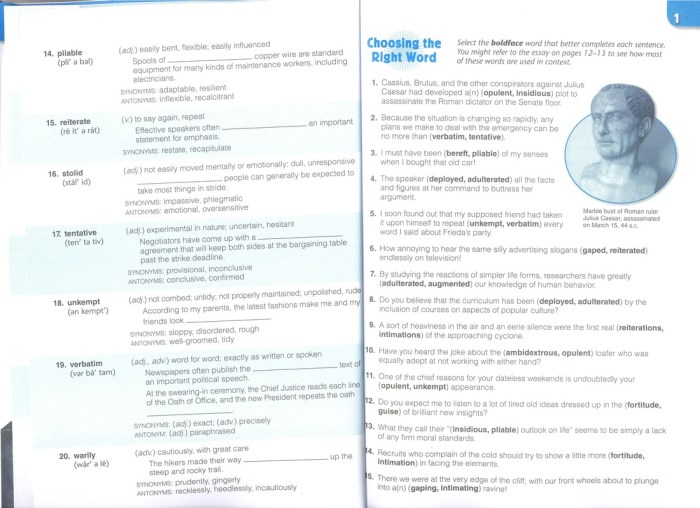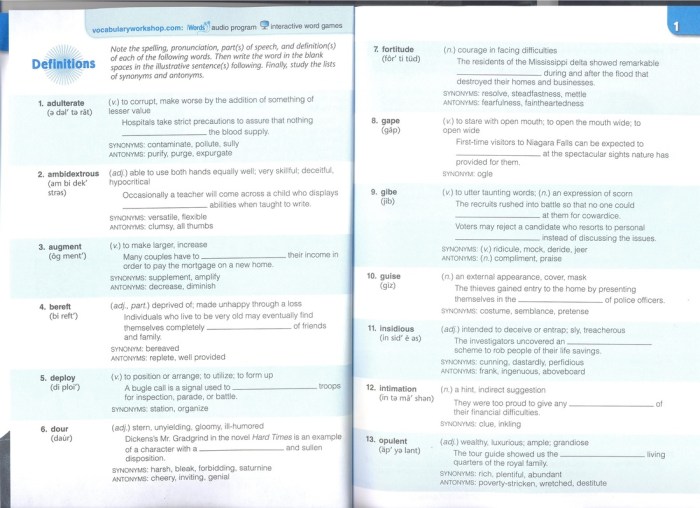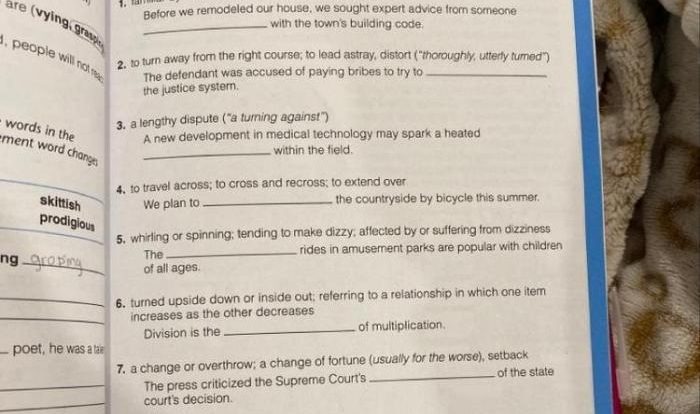Embark on a captivating journey through Vocab Workshop Level E Unit 2, where the intricacies of language unfold, unlocking new horizons of expression.
This unit delves into the core concepts and themes of vocabulary, empowering you to master the nuances of word usage, etymology, and cultural influences.
Vocabulary Workshop Level E Unit 2: Vocab Workshop Level E Unit 2

Vocabulary Workshop Level E Unit 2 aims to enhance students’ vocabulary and comprehension skills through engaging activities and exercises. This unit focuses on building a strong foundation in academic vocabulary and developing strategies for effective word learning.
The target audience for this unit is students in English language learning programs who have reached an intermediate level of proficiency. These students have a basic understanding of English vocabulary and grammar and are ready to expand their vocabulary and improve their comprehension abilities.
Target Vocabulary
The target vocabulary in this unit includes academic words commonly used in textbooks, academic articles, and other formal contexts. These words are essential for students to understand and use effectively in their academic writing and speaking.
- Cogent
- Discernible
- Empirical
- Hypothesis
- Lucid
Strategies for Word Learning
This unit introduces various strategies for effective word learning, including:
- Contextualization: Learning words within the context of authentic texts
- Chunking: Breaking down complex words into smaller, more manageable units
- Mnemonics: Using memory aids such as rhymes, acronyms, or images
- Spaced repetition: Reviewing words at increasing intervals to enhance retention
Key Concepts and Themes
Vocabulary Workshop Level E Unit 2 delves into a range of significant vocabulary concepts that revolve around the theme of “Communication and Connection.”
The unit explores words related to expressing ideas, building relationships, and navigating social situations. These concepts are essential for effective communication and form the foundation of human interaction.
Expressing Ideas
This focuses on vocabulary related to conveying thoughts and feelings clearly and effectively. Key concepts include:
- Articulate: To express oneself clearly and effectively
- Eloquence: The ability to speak or write with great fluency and persuasiveness
- Precise: Using exact and specific language to convey a message
Word Analysis and Meaning
In this section, we will delve into the etymology and morphology of the vocabulary words from Unit 2 of Level E Vocabulary Workshop. We will explore the nuances of their meaning and usage, categorizing them based on their part of speech or semantic field.
Etymology and Morphology
Etymology refers to the origin and history of words, while morphology deals with their structure and formation. Understanding these aspects helps us grasp the deeper meanings and relationships between words.
For instance, the word “abrogate” comes from the Latin word “abrogare,” meaning “to repeal or annul.” Its prefix “ab-” denotes separation, and the root “rogare” means “to ask or request.” Thus, “abrogate” implies the act of officially canceling or repealing something that was previously requested or enacted.
Similarly, the word “ephemeral” originates from the Greek word “ephemeros,” meaning “lasting for a day.” It consists of the root “ephemer-” and the suffix “-al,” which indicates a quality or characteristic. Hence, “ephemeral” describes something that is short-lived or transient.
Nuances of Meaning and Usage
Words often have subtle differences in meaning and usage that can impact their appropriateness in different contexts. For example, the words “abolish” and “repeal” both mean to end or cancel something, but “abolish” typically implies a complete and permanent removal, while “repeal” suggests a more temporary or partial cancellation.
Another example is the words “diminutive” and “miniature.” Both describe something small, but “diminutive” emphasizes a reduction in size, while “miniature” implies a small size that is intentional or artificial.
Categorization of Words
To facilitate understanding and retention, we can categorize the vocabulary words based on their part of speech or semantic field. A table summarizing this categorization is provided below:
| Part of Speech/Semantic Field | Words |
|---|---|
| Verbs | abrogate, abolish, repeal, diminish |
| Adjectives | ephemeral, diminutive, miniature |
| Nouns | abrogation, diminution |
Vocabulary Building Strategies
Vocabulary building is an essential aspect of language learning. It enhances communication skills, improves comprehension, and broadens our understanding of the world. This section explores effective strategies to learn and retain vocabulary words, along with activities and tips for incorporating them into everyday language.
Active Learning
Active learning involves engaging with vocabulary words in a meaningful way. This can include:
- Reading: Immerse yourself in texts, paying attention to unfamiliar words and their context.
- Writing: Use new words in your writing to reinforce their meaning and usage.
- Speaking: Practice using the words in conversations or presentations to enhance recall.
Spaced Repetition
Spaced repetition is a technique that involves reviewing vocabulary words at increasing intervals. This helps to strengthen memories and prevent forgetting. You can use flashcards, apps, or spaced repetition software to implement this strategy.
Contextualization
Understanding words in context is crucial for retention. Engage with vocabulary words in authentic materials such as news articles, videos, or conversations. This helps you grasp their usage and nuances.
Mnemonic Devices, Vocab workshop level e unit 2
Mnemonic devices can make memorizing vocabulary words more fun and effective. These include:
- Chunking: Breaking down large words into smaller, manageable chunks.
- Rhyming: Creating rhymes or songs to associate with vocabulary words.
- Imagery: Visualizing or creating mental images of the words.
Incorporating into Everyday Language
To make vocabulary learning meaningful, it’s important to incorporate new words into everyday language. This can be done through:
- Conversation: Use new words in conversations with friends, family, or colleagues.
- Writing: Incorporate vocabulary words into emails, social media posts, or creative writing.
- Reflection: Regularly review and reflect on the vocabulary words you’ve learned and how you can use them.
Contextualization and Application

Vocabulary words come alive when we encounter them in real-world situations. Understanding how they’re used in context enriches our comprehension and enables us to apply them effectively in our own communication.
Illustrating Usage
Consider the word “gregarious.” In a sentence, it might appear as: “The gregarious extrovert effortlessly engaged with everyone at the party.” Here, the word vividly portrays an individual’s outgoing and sociable nature.
Contextual Impact
Context significantly influences word meaning. For instance, “resolution” can refer to a formal decision or a determination to overcome a challenge. The specific meaning becomes clear based on the context in which it’s used.
Strategies for Application
To enhance our understanding and application of vocabulary, we can:
- Read widely and pay attention to how words are employed in different contexts.
- Engage in conversations and discussions that expand our vocabulary and expose us to new usage.
- Practice using the words in our own writing and speech, ensuring they align with the intended meaning and context.
Cultural and Historical Perspectives
Language and vocabulary are deeply intertwined with the cultural and historical contexts in which they develop. Exploring the cultural and historical influences on vocabulary words can provide valuable insights into the evolution of language, the shaping of societies, and the ways in which different cultures and historical periods have understood and expressed the world around them.
Many words have undergone significant changes in meaning or usage over time, reflecting shifts in societal values, technological advancements, and cultural norms. Understanding these changes can help us appreciate the dynamic nature of language and the ways in which it adapts to changing circumstances.
The Role of Vocabulary in Understanding Different Cultures
Vocabulary plays a crucial role in understanding different cultures. By delving into the vocabulary of a particular culture, we gain access to its unique perspectives, values, and ways of thinking. Cultural-specific words and phrases often carry meanings that cannot be directly translated into other languages, providing a glimpse into the intricate nuances of a culture.
The Role of Vocabulary in Understanding Historical Periods
Vocabulary can also serve as a window into the past, offering insights into the lives, beliefs, and experiences of people in different historical periods. By examining the vocabulary used in historical documents, literature, and other sources, we can gain a deeper understanding of the social, political, and cultural contexts of the time.
The vocab workshop level e unit 2 has been a great way to improve my vocabulary. I’ve learned a lot of new words, and I’m starting to feel more confident in my ability to express myself in Spanish. To practice my new vocabulary, I recently took the repaso de comida y salud quiz . I’m happy to report that I did pretty well! I’m looking forward to continuing to learn new vocabulary and improve my Spanish skills.
Assessment and Evaluation

Assessing and evaluating students’ vocabulary development is crucial to monitor their progress and provide timely support. This section presents formative and summative assessments to measure students’ understanding and application of the vocabulary words in Unit 2.
In addition, ongoing assessment and monitoring techniques are suggested to track students’ vocabulary growth and inform instructional decisions.
Formative Assessment
Formative assessments are designed to provide feedback during the learning process. They help identify areas where students need additional support and inform instructional adjustments.
- Vocabulary Journal:Students can maintain a vocabulary journal where they record new words, their definitions, and example sentences. This ongoing activity encourages active engagement with the vocabulary and provides a record of their progress.
- Word Sorts:Word sorts involve categorizing words based on their meanings or relationships. This activity promotes deeper understanding of word relationships and allows the teacher to assess students’ ability to discern subtle differences in word meanings.
- Quick Quizzes:Short, regular quizzes can be administered to check students’ understanding of the vocabulary words. These quizzes can include multiple-choice questions, fill-in-the-blank exercises, or matching activities.
Summative Assessment
Summative assessments evaluate students’ overall understanding and ability to use the vocabulary words in context. These assessments are typically administered at the end of a unit or course.
- Vocabulary Essay:Students can write an essay that incorporates several vocabulary words from the unit. This assessment allows students to demonstrate their ability to use the words correctly and coherently in a written context.
- Oral Presentation:Students can prepare an oral presentation on a topic related to the unit. They should incorporate vocabulary words into their presentation and demonstrate their understanding of their meanings and usage.
- Vocabulary Test:A comprehensive vocabulary test can assess students’ knowledge of the word meanings, synonyms, antonyms, and usage. This test can include a variety of question types, such as multiple-choice, short answer, and matching.
Ongoing Vocabulary Assessment and Monitoring
Ongoing vocabulary assessment and monitoring are essential to track students’ progress and identify areas for support. These techniques can include:
- Observation:Observing students during discussions, presentations, and writing assignments can provide insights into their vocabulary knowledge and usage.
- Student Self-Assessment:Students can self-assess their vocabulary development by reflecting on their understanding of the words and their ability to use them in different contexts.
- Technology Tools:Vocabulary learning apps and online platforms can provide real-time data on students’ progress and areas for improvement.
Q&A
What is the purpose of Vocab Workshop Level E Unit 2?
To enhance your vocabulary by exploring key concepts, word analysis, and real-world applications.
Who is the target audience for this unit?
Students, language learners, and anyone seeking to improve their vocabulary.
